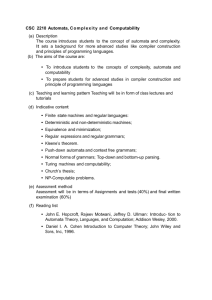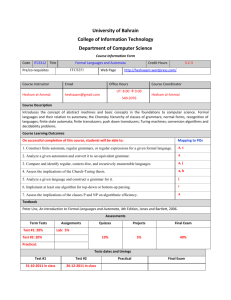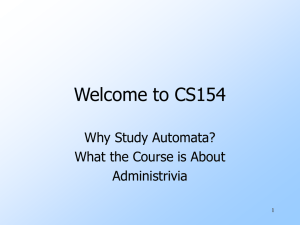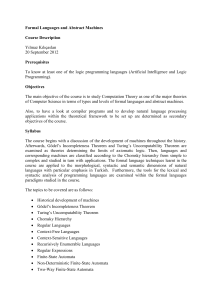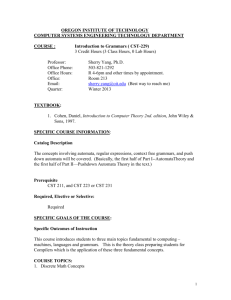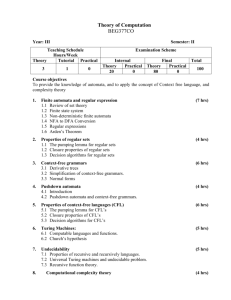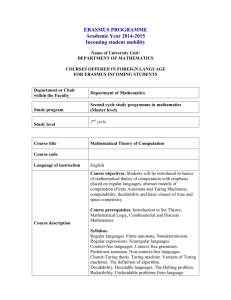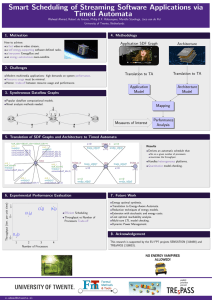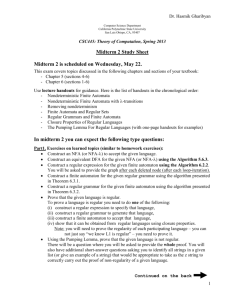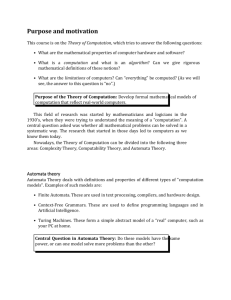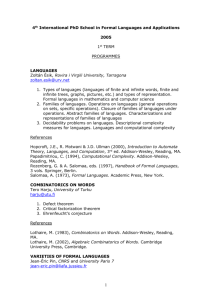CMPE 471 Automata Theory - Computer Engineering Department
advertisement
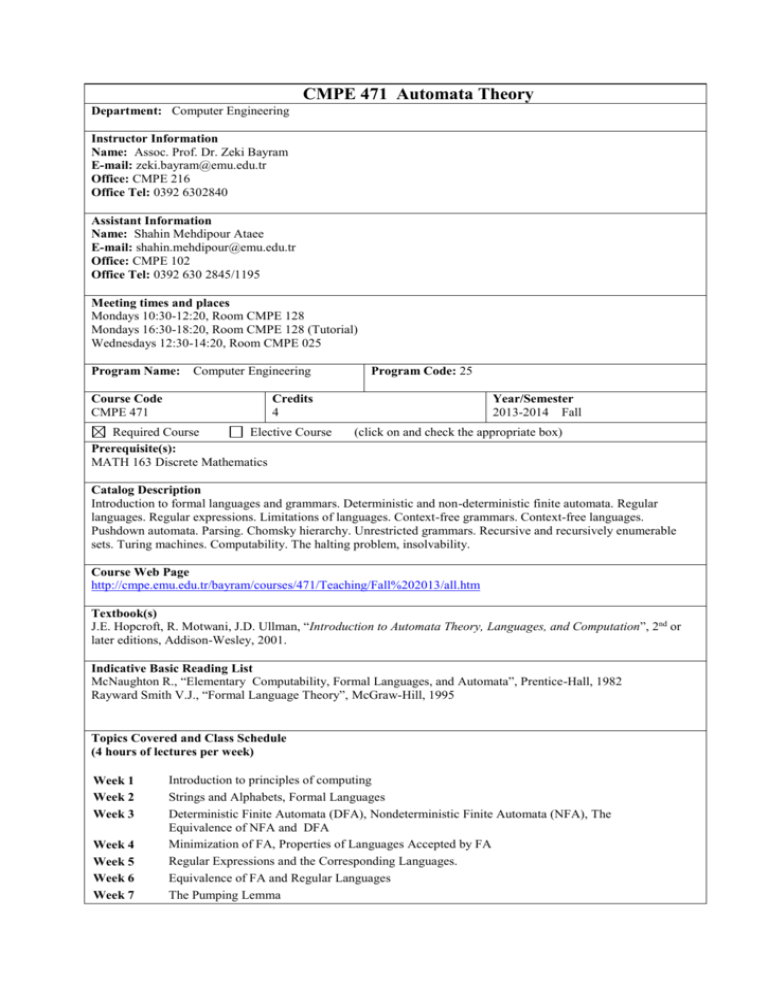
CMPE 471 Automata Theory Department: Computer Engineering Instructor Information Name: Assoc. Prof. Dr. Zeki Bayram E-mail: zeki.bayram@emu.edu.tr Office: CMPE 216 Office Tel: 0392 6302840 Assistant Information Name: Shahin Mehdipour Ataee E-mail: shahin.mehdipour@emu.edu.tr Office: CMPE 102 Office Tel: 0392 630 2845/1195 Meeting times and places Mondays 10:30-12:20, Room CMPE 128 Mondays 16:30-18:20, Room CMPE 128 (Tutorial) Wednesdays 12:30-14:20, Room CMPE 025 Program Name: Course Code CMPE 471 Computer Engineering Program Code: 25 Credits 4 Required Course Elective Course Prerequisite(s): MATH 163 Discrete Mathematics Year/Semester 2013-2014 Fall (click on and check the appropriate box) Catalog Description Introduction to formal languages and grammars. Deterministic and non-deterministic finite automata. Regular languages. Regular expressions. Limitations of languages. Context-free grammars. Context-free languages. Pushdown automata. Parsing. Chomsky hierarchy. Unrestricted grammars. Recursive and recursively enumerable sets. Turing machines. Computability. The halting problem, insolvability. Course Web Page http://cmpe.emu.edu.tr/bayram/courses/471/Teaching/Fall%202013/all.htm Textbook(s) J.E. Hopcroft, R. Motwani, J.D. Ullman, “Introduction to Automata Theory, Languages, and Computation”, 2nd or later editions, Addison-Wesley, 2001. Indicative Basic Reading List McNaughton R., “Elementary Computability, Formal Languages, and Automata”, Prentice-Hall, 1982 Rayward Smith V.J., “Formal Language Theory”, McGraw-Hill, 1995 Topics Covered and Class Schedule (4 hours of lectures per week) Week 1 Week 2 Week 3 Week 4 Week 5 Week 6 Week 7 Introduction to principles of computing Strings and Alphabets, Formal Languages Deterministic Finite Automata (DFA), Nondeterministic Finite Automata (NFA), The Equivalence of NFA and DFA Minimization of FA, Properties of Languages Accepted by FA Regular Expressions and the Corresponding Languages. Equivalence of FA and Regular Languages The Pumping Lemma Week 8 Week 9 Week 10 Week 11 Week 12 Week 13 Context-Free Grammars. Properties of Context Free Languages (CFL), Derivations, parse trees and ambiguity Useless Symbols, Chomsky and Greibach Normal Forms. Push-down automata (PDA), acceptance by final state acceptance by empty stack and their equivalence, Instantaneous Descriptions for PDAs Equivalence of CFLs and PDAs, parsing, Turing Machines (TM), Instantaneous Descriptions for TMs Review Tutorial Schedule Weeks 3-4 Mathematical principles, Strings and Alphabets, Formal Languages, Finite Automata Weeks 5-6 Finite automata, Regular Expressions The Equivalence of Nondeterministic Finite Automata (NFA) and DFA, Minimizing automata, Equivalence of FA and Regular Languages, Pumping Lemma Context Free Languages and Push-down automata, Context Free Grammars, Parse trees, Normal Weeks 8-9 forms Weeks 11-12 Turing Machines (design, tracing) Weeks 6-7 Course Learning Outcomes Upon successful completion of the course, students are expected to have the following competencies: (1) Design/Use/Trace finite automata (2) Convert non-deterministic automata to deterministic automata (3) Use regular expressions for specifying languages (4) Convert between regular expressions and finite automata (5) Minimize finite automata (6) Design/Use context free grammars (7) Put a context-free grammar into various normal forms (8) Design/Use/Trace push down automata (9) Design/Use/Trace Turing machines (10) Convert between context free grammars and push-down automata (11) Formally describe languages generated by regular expressions and grammars, or accepted by finite automata, PDA and Turing Machines Method No Percentage Midterm Exam(s) 1 40% Final Examination 1 45% Attendance 1 5% Assignments 2 10% Computation of the attendance grade: Less than 50%, 0 points. At least 75% attendance, 5 points. Otherwise 5 * (number of days attended / number of days attendance taken). Attendance will start to be taken once the add-drop period has ended. Assessment Policy on makeups: For eligibility to take a makeup exam, the student should bring a doctor's report within 3 working days of the missed exam. Policy on cheating and plagiarism: Any student caught cheating at the exams or assignments will automatically fail the course and may be sent to the disciplinary committee at the discretion of the instructor. Contribution of Course to ABET Criterion 5 Credit Hours for: Mathematics & Basic Science : 0 Engineering Sciences and Design : 4 General Education : 0 Relationship of the course to Program Outcomes The course has been designed to contribute to the following program outcomes: a) apply knowledge of mathematics, science, and engineering e) identify, formulate, and solve engineering problems i) a recognition of the need for, and an ability to engage in life-long learning Prepared by: Assoc. Prof. Dr. Zeki Bayram Date Prepared: 2 October 2013
